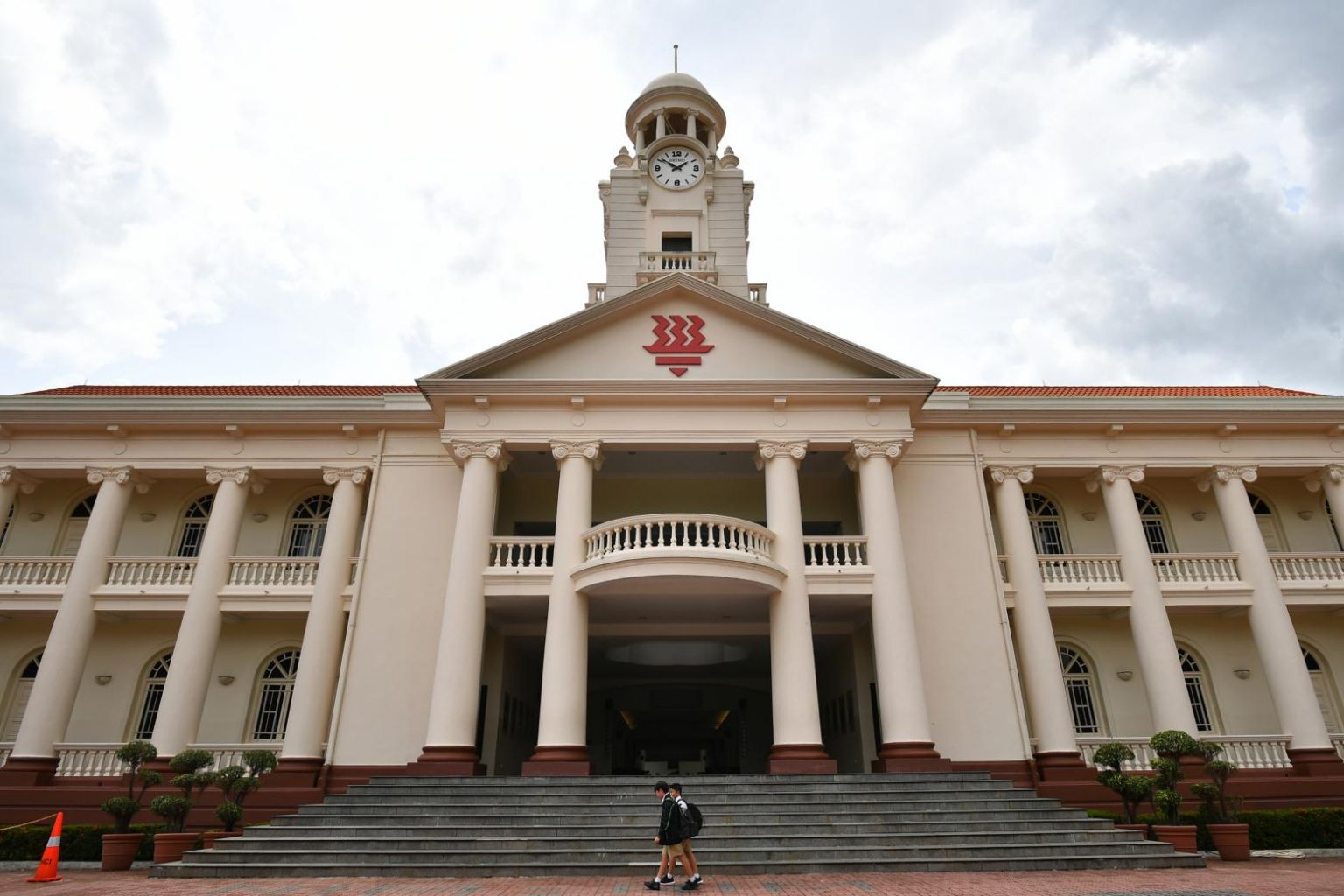
Choosing a new school for your child is an exciting milestone. There are many aspects you should consider when taking this vital step. and it’s only natural that you do your research.
Whether you’re deciding on a primary or secondary school, you’re probably interested in things like location, affiliation, gender, and school culture. You may have also heard of SAP schools.
Whether you know a lot about SAP schools or nothing at all, this article is meant to shed light on how these schools were created, what they look like now, details on admission, and some common concerns that we’ll address.
But first things first – what does “SAP” stand for?
What is a SAP school?

The Special Assistance Plan, or SAP for short, is a program dedicated to academically strong students skilled in both Chinese and English.
Only primary and secondary schools focused on Mandarin as a mother tongue offer the Special Assistance Plan. For this reason, SAP schools are often referred to as “Chinese” schools.
SAP schools benefit from government support and funding in an effort to preserve the Chinese language and culture, which is a big part of Singapore’s multicultural identity.
Why were SAP schools created?
Since English was first adopted as Singapore’s main official language in 1965, parents felt more inclined to send their children to English-speaking schools to offer them more opportunities in an increasingly globalized world.
In the 70s, American culture was rapidly gaining ground in Singapore. As a result, most of the vernacular schools were in danger of closing. The government’s reaction to this cultural context was the creation of the Special Assistance Plan in 1979.
Nine Chinese-founded schools were chosen for this purpose at first, and, over time, this number grew to 26 schools.
Encouraging parents to enroll their children in SAP schools wasn’t easy at first. But with additional incentives and resources, SAP schools started performing better. SAP schools have been maintaining top positions in primary and secondary school rankings for decades.

So now that you understand the historical context of how SAP schools came to be, you may be considering enrolling your child into one, or perhaps you’re just curious to find out more.
Let’s look into which schools offer the SAP program today.
Which schools in Singapore are SAP schools?
The Special Assistance Plan is offered in both primary (elementary) and secondary (high school) schools in Singapore – a total of 15 primary schools and 11 secondary schools as listed in the table below:
SAP Primary Schools
| Primary School | Gender | Area | Affiliation | GEP |
|---|---|---|---|---|
| Ai Tong School 爱同学校 | Mixed | Bishan | Singapore Hokkien Huay Kuan | |
| Catholic High School 公教中学 (附小) | Boys | Bishan | Yes | |
| CHIJ St. Nicholas Girls' School 圣尼格拉女校 (小学部) | Girls | Ang Mo Kio | ||
| Holy Innocents’ Primary School 圣婴小学 | Mixed | Hougang | ||
| Hong Wen School 宏文学校 | Mixed | Kallang | ||
| Kong Hwa School 光华学校 | Mixed | Geylang | Singapore Hokkien Huay Kuan | |
| Maha Bodhi School 菩提学校 | Mixed | Geylang | ||
| Maris Stella High School (Primary) 海星中学 (附小) | Boys | Toa Payoh | ||
| Nan Hua Primary School 南华小学 | Mixed | Clementi | Yes | |
| Nanyang Primary School 南洋小学 | Mixed | Bukit Timah | Yes | |
| Pei Chun Public School 公立培群学校 | Mixed | Toa Payoh | ||
| Pei Hwa Presbyterian Primary School 培华长老会小学 | Mixed | Bukit Timah | ||
| Poi Ching School 培青学校 | Mixed | Tampines | ||
| Red Swastika School 卍慈学校 | Mixed | Bedok | ||
| Tao Nan School 道南学校 | Mixed | Marine Parade | Singapore Hokkien Huay Kuan | Yes |
SAP Secondary Schools
| Secondary School | Gender | Area | Affiliation |
|---|---|---|---|
| Anglican High School 圣公会中学 | Mixed | Tanah Merah | St Andrew's Junior College |
| Catholic High School 公教中学 | Boys | Bishan | Eunoia Junior College (IP) Singapore Chinese Girls' School (IP) CHIJ Saint Nicholas Girls' School (IP) Catholic Junior College (Non-IP) |
| CHIJ Saint Nicholas Girls' School 圣尼各拉女校 | Girls | Ang Mo Kio | Eunoia Junior College (IP) Singapore Chinese Girls' School (IP) Catholic High School (IP) Catholic Junior College (Non-IP) CHIJ St. Nicholas Girls' School (Primary) |
| Chung Cheng High School (Main) 中正中学 (总校) | Mixed | Marine Parade | Nanyang Junior College (Non-IP) Chung Cheng High School (Yishun) (Non-IP) |
| Dunman High School 德明政府中学 | Mixed | Tanjong Rhu | Raffles Junior College Hwa Chong Junior College Victoria Junior College Top Feeder School Temasek Junior College Top Feeder School |
| Hwa Chong Institution 华侨中学 | Boys | Bukit Timah | Nanyang Girls' High School (IP) |
| Maris Stella High School 海星中学 | Boys | Toa Payoh | Catholic Junior College (Non-IP) Maris Stella High School (Primary) |
| Nan Chiau High School 南侨中学 | Mixed | Sengkang | Singapore Hokkien Huay Kuan |
| Nan Hua High School 南华中学 | Mixed | Clementi | |
| Nanyang Girls' High School 南洋女子中学校 | Girls | Bukit Timah | Hwa Chong Institution (IP) Nanyang Primary School |
| River Valley High School 立化中学 | Mixed | Boon Lay |
What are some benefits of going to a SAP school?

When choosing one of the schools above, you can be sure that your child’s education will be taken very seriously.
Here are a few main reasons why you might be interested in getting your child into a SAP school:
- Your child will develop a strong command of both English and Mandarin, two of the most spoken languages in the world;
- Aside from bilingual education, SAP schools also teach conversational Malay, with more diverse mother tongues entering the curriculum;
- Your child will learn more about Chinese culture (calligraphy, Chinese history, etc.) and benefit from the traditional Chinese discipline and resilience;
- Resources, IT equipment, and campus size are often better in SAP schools compared to heartland schools;
- SAP schools have a lower student to teacher ratio, which means your child will get more one-on-one attention;
- SAP schools’ high standards of admission only allow top-rated students to get in, which builds a pool of talented, capable classmates;
- As a graduate of a SAP primary school, your child’s chances of admission into a SAP high school increase significantly;
- On the same note, SAP high school alumni are well equipped for applying to any college, whether in Singapore or abroad;
- SAP school graduates can benefit from living abroad, as many SAP schools offer student exchange programs with China. This translates into extended work opportunities in the future;
SAP School Admission – What You Need to Know
You may be wondering what it takes for a student to get admitted into a SAP school. Whether your child is about to enroll in a primary or secondary school, we’re here to cover the basics and give you a better understanding of what these schools have to offer.

What to consider before enrolling your child in a SAP primary school?
If your child’s mother tongue is Chinese, you should know that SAP primary schools offer Higher Chinese education as early as Primary 1. While Chinese is taught in all schools, learning Higher Chinese could pave the way for admission to top SAP secondary schools in the future.
Another thing you should consider is that four out of the fifteen SAP primary schools – the Catholic High School, Nan Hua Primary School, Nanyang Primary School, and Tao Nan School – offer the Gifted Education Programme (GEP) for a number of selected students.
You can find more information on GEP in this detailed article. The Gifted Education Programme begins in Primary 4 when classes become more advanced and fast-paced. While your child may struggle at first, GEP is a great opportunity for teaching students more about how to learn effectively and keep up with the pressure of intensive classes.
The basics of admission into an SAP secondary school

Getting admitted into one of the SAP high schools can be challenging for your child. Only a select few of the students scoring in the PSLE top 10% are admitted every year. Aside from that, students also need to get an A in both English and Mandarin.
The new PSLE scoring system has recently come into effect and ranges from 4 to 32, with 4 being the best. While students taking the PSLE no longer need to take perfect scores to get into top secondary schools, SAP schools prefer their applicants’ PSLE scores to range between 4 and 14.
Aside from focusing on an excellent PSLE score, there are a couple of other advantages that your child may benefit from when applying to a SAP secondary school:
- School affiliation. School affiliation is an old tradition in Singapore. Its purpose is to ensure continuity and a strong school spirit among the affiliated schools. If your child is currently enrolled in an affiliated primary school, he or she will be prioritized for admission to the corresponding secondary school.
- Scoring high on HCL (Higher Chinese Language). Having a Distinction, Merit, or proficiency in HCL can help your child move up in the admission ranking.
Do you need to study Higher Chinese to get into a SAP school?
While HCL can pose a great advantage, the short answer is no – your child doesn’t need to take HCL to get into a SAP school. PSLE scores are still what matters most.
An HCL Distinction, Merit, or Pass comes into play when SAP schools have to choose between multiple students with an identical PSLE score. In this case, students with good results in HCL will be prioritized for admission, like in this example below:
| PSLE | HCL score | SAP school admission ranking |
|---|---|---|
| 7 | No HCL | 1st |
| 8 | Distinction | 2nd |
| 8 | Merit | 3rd |
| 8 | Pass | 4th |
| 8 | No HCL | 5th |
| 9 | Distinction | 6th |
While Higher Chinese isn’t a requirement for applying to a SAP school, taking Higher Chinese in primary school might prove useful, and not just for admission reasons. Your child’s transition into a SAP secondary school might be smoother if your child already acquired strong Mandarin skills during primary school.
What about racial eligibility?

Since enrolling students in SAP primary schools is based mainly on the children’s mother tongue, the vast majority of SAP school students will be Chinese. But this doesn’t mean that ethnicity or race are criteria for admission.
In fact, you shouldn’t be surprised to find a Malay or Indian student speaking Mandarin as fluently as a native, although they are so rare that The Strait Times describes them as an “oddity.”
Racial homogeneity inside SAP schools could make a student of a different race feel like an outcast sometimes. Still, most non-Chinese SAP school students report that their schoolmates converse in English and are happy to welcome and interact with different ethnicities.
How do you prepare for getting into a SAP school?
Your child’s PSLE score could potentially influence his or her future. A higher PSLE score will give your child access to some of the highest-rated schools in Singapore. If you’re interested in applying for a SAP secondary school, the best way to ensure success is to improve your child’s PSLE performance.
So how do you help your child revise for these important exams? Books may have been the way to go in the past, but as technology enhances the way we live and learn, there are many new solutions to help students process and retain information.
You can choose from the many apps that pride themselves on practical and engaging learning. Check this comprehensive article to discover the best online aids for PSLE.
Alternatively, you could provide your child with one-on-one attention and hire a PSLE tutor. Here, at SmileTutor, we follow the official MOE scheme of work and pride ourselves on offering personalized and practical help with PSLE exams.

Concerns and criticisms: Are SAP schools elitist?
While SAP schools came to existence because of the rapidly closing vernacular schools in Singapore, Chinese schools weren’t the only ones suffering. Malay and Tamil-medium schools ended up closing as well.
The fact that the government chose to only support Chinese-founded schools was intensely debated and considered unfair and non-inclusive by people of non-Chinese ethnicity.
SAP schools offer excellent education and pride themselves on only admitting a fraction of students. For this reason, they are accused of being elitist and contributing to racial division.
With SAP schools, the main expressed concern is that SAP school students are painfully unaware of the cultural diversity that exists outside of their SAP school bubble, which leads to unintentional stereotyping and racial discrimination. Many students admit to being virtually unexposed to non-Chinese peers until late in adolescence.
Another harsh reality is that many of the SAP school students come from upper-class and upper-middle-class families, which may not help in teaching young adults how to be relatable, humble, and connected to what’s going on in the real world.
All these factors – lack of exposure to other cultures, admission of elite students, and social advantage – lead to SAP schools perpetuating what is known as the “Chinese privilege” in Singapore’s society.
Naturally, educating your child on being inclusive and respectful begins at home and within your neighborhood community, but you might want to consider these aspects before enrolling your child in a SAP school.
Will the SAP school model change?

Education Minister Ong Ye Kung claims that SAP school authorities are aware of these shortcomings and working towards racial inclusion.
As an example, Hong Wen School – a SAP school – collaborates with Alexandra Primary and Radin Mas Primary annually to celebrate Racial Harmony Day. Other SAP schools organize festive seasons and national events together, as well as cultural exchange trips.
Religious, single-gender SAP schools like the Catholic High School (CHS) are promoting diversity as well. They focus on universal moral values and don’t make presence to mass mandatory for their students, although some form of spirituality is encouraged.
The Special Assistance Plan still has a long way to go to become inclusive towards non-Chinese Singaporeans who may feel disadvantaged when it comes to learning opportunities, but that doesn’t mean it isn’t evolving.
Conclusion
SAP schools are an attractive option for many reasons. Primary schools allow your child the opportunity to become fluent in both English and Mandarin in a world where being bilingual is increasingly important.
SAP secondary schools, with their high standards, attractive school culture, and community appeal to many students. More than just offering an insight into Chinese culture and traditions, these high schools are the stepping stones to getting into elite colleges.
But with such a tight competition, getting into a SAP secondary school may not be such an easy task for your child. The good news is that there are plenty of resources and support systems to help with your child’s Chinese skills and PSLE preparation.
As always, Smile Tutor is here to provide you the best information you need for choosing schools and enhancing your child’s learning abilities. Choose from one of our many tutors to provide one-on-one assistance on whichever subject needs more attention.
Hopefully, we’ve answered many of your questions regarding SAP schools today. Best of luck with admissions!
